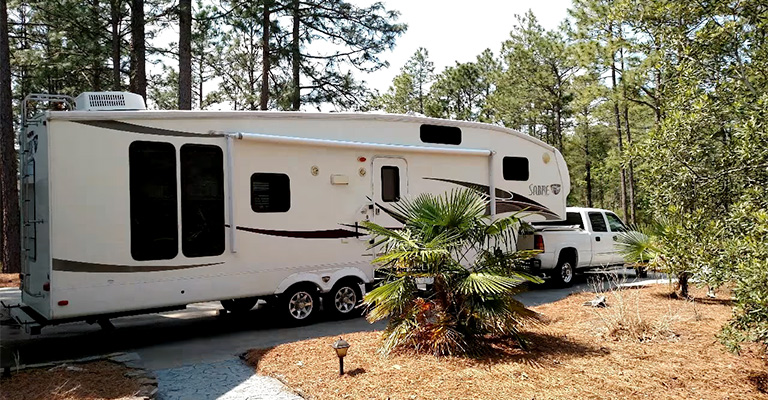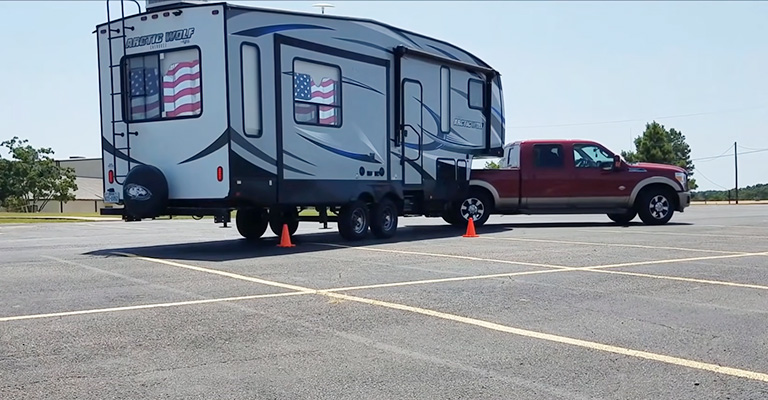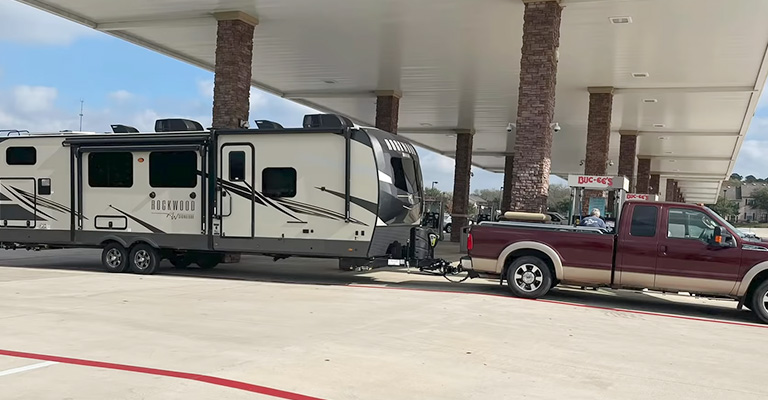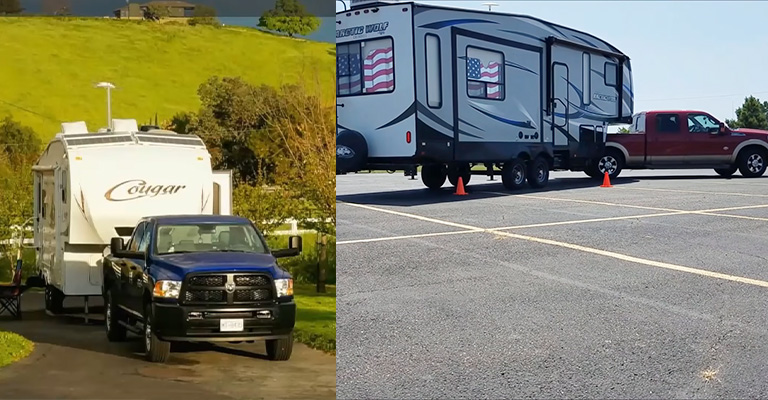When it comes to towing a large recreational vehicle, such as a 5th wheel, there are a number of different options available. However, one question that often arises is whether or not a 5th wheel can be pulled using a regular hitch.
To answer this question, it is important to first understand what a 5th wheel and a regular hitch are, and the differences between them. In this blog, we will provide a brief explanation of these terms, the purpose of the blog, and a quick overview of the content.
A 5th wheel is a type of recreational vehicle that is designed to be pulled by a pickup truck. It is typically larger and heavier than a regular travel trailer and is often used for extended trips or as a permanent residence.
The 5th wheel gets its name from the way it is attached to the tow vehicle – a kingpin, or a large ball, is mounted in the bed of the truck, and the 5th wheel hitch engages with this ball to create a secure connection.
A regular hitch, on the other hand, is a type of trailer hitch that is commonly used to tow a variety of trailers, including travel trailers and boat trailers.
A regular hitch typically attaches to the frame of the tow vehicle, and the trailer is connected to the hitch using a ball and socket connection.

Understanding the Differences Between a 5th Wheel and a Regular Hitch
Definition of a 5th Wheel and a Regular Hitch
A 5th wheel is a type of hitch that is attached to the bed of a pickup truck. It is designed to tow large recreational vehicles, such as travel trailers and motorhomes, and provides a more stable and secure connection between the towing vehicle and the trailer.
The 5th wheel gets its name from the shape of the hitch, which resembles a small wheel that rotates around a central axis.
On the other hand, a regular hitch is a type of hitch that is attached to the frame of a vehicle. It is typically used to tow smaller trailers, such as boat trailers and utility trailers. Regular hitches come in different classes, which determine the weight capacity they can handle.
How a 5th Wheel and a Regular Hitch Work

A 5th wheel hitch works by connecting the towing vehicle to the trailer at a higher point than a regular hitch. This allows for better weight distribution and stability, making it easier to handle large and heavy trailers.
The hitch is attached to the bed of the pickup truck using a mounting plate, and the trailer is connected to the hitch using a kingpin.
A regular hitch, on the other hand, connects the towing vehicle to the trailer at a lower point. This can make it more difficult to handle large and heavy trailers, as the weight is not evenly distributed.
The hitch is attached to the frame of the vehicle using bolts and nuts, and the trailer is connected to the hitch using a ball and socket joint.
Advantages and Disadvantages of a 5th Wheel and a Regular Hitch

The advantages of a 5th-wheel hitch include its stability, weight distribution, and ease of use. The higher connection point also allows for more maneuverability and better towing performance.
However, the disadvantage of a 5th-wheel hitch is that it is limited to pickup trucks, and cannot be used with other types of vehicles.
Regular hitches have the advantage of being more versatile, as they can be used with a variety of vehicles. However, the lower connection point can make it more difficult to handle large and heavy trailers, and the weight distribution is not as balanced as with a 5th-wheel hitch.
Additionally, regular hitches may require more maintenance and upkeep than a 5th wheel hitch.
Can You Pull a 5th Wheel With a Regular Hitch?
The Importance of Matching the Hitch and the Vehicle

When it comes to towing, it is crucial to match the hitch and the vehicle. A 5th wheel and a regular hitch serve different purposes and have different weight capacities.
A 5th wheel hitch is designed to handle the weight of larger RVs and travel trailers, while a regular hitch is better suited for lighter loads.
The Weight Capacity of the Hitch and the Vehicle
The weight capacity of a hitch and a vehicle is determined by the manufacturer’s specifications. It is important to make sure that the hitch you choose can handle the weight of the trailer you want to tow.
A 5th wheel hitch has a higher weight capacity compared to a regular hitch, typically ranging from 15,000 to 30,000 pounds. A regular hitch, on the other hand, typically has a weight capacity ranging from 2,000 to 8,000 pounds.
The Types of Vehicles Suitable for Pulling a 5th Wheel

Not all vehicles are suitable for pulling a 5th wheel. Pickup trucks are the most common type of vehicle used to tow a 5th wheel, as they have a high weight capacity and are designed to handle the weight of a large trailer.
Some larger SUVs and commercial vehicles can also be used to tow a 5th wheel, but it is important to check the manufacturer’s specifications to ensure that they are suitable for this type of towing.
Safety Considerations When Pulling a 5th Wheel With a Regular Hitch
Importance of Proper Loading and Weight Distribution
Proper loading and weight distribution are crucial when towing a 5th wheel, especially when using a regular hitch. The weight of the trailer and its contents must be properly distributed to prevent the vehicle from becoming unbalanced and potentially causing an accident.
It’s important to ensure that the hitch and vehicle are rated for the weight being towed and to follow the manufacturer’s guidelines for weight distribution.
Essential Safety Features for a Towing Vehicle
A towing vehicle must have several essential safety features to ensure a safe and stable towing experience. This includes anti-sway control, trailer brakes, and a weight-distributing hitch. These features help to prevent the trailer from swaying, ensure proper braking, and maintain stability while towing.
Recommended Maintenance for the Hitch and the Vehicle
Regular maintenance of the hitch and the towing vehicle is also important for ensuring a safe towing experience.
This includes regularly checking the hitch and trailer connection, checking the tire pressure and tread on both the vehicle and the trailer, and regularly maintaining the brakes and suspension on both.
Additionally, it’s important to regularly inspect the hitch and vehicle for signs of wear and to replace any worn or damaged parts.
Installing a 5th Wheel Hitch on a Regular Hitch
Installing a 5th wheel hitch on a regular hitch is a complex process that requires specialized tools and equipment. While some experienced DIYers may feel comfortable with tackling this project, others may prefer to leave it to the professionals.
Before beginning, it is important to gather all necessary tools, including a drill, a level, and a torque wrench. The step-by-step instructions for installation may vary depending on the type of 5th wheel hitch and the vehicle, so it is important to refer to the manufacturer’s instructions.
A professional installation may take less time and provide peace of mind, but it can also be more expensive. Ultimately, the choice between professional installation and DIY installation will depend on individual skills, budget, and confidence.
Cost Considerations When Pulling a 5th Wheel With a Regular Hitch
When it comes to cost considerations for pulling a 5th wheel with a regular hitch, there are several factors to take into account. Firstly, the cost of purchasing a 5th wheel hitch is one of the main expenses to consider.
This can range from several hundred dollars for a basic model to several thousand dollars for a high-end, heavy-duty hitch. Secondly, the cost of installation and maintenance must also be considered.
This will depend on whether you choose to install the hitch yourself or have it professionally installed. Professional installation can be expensive, but it may be necessary if you are not familiar with the process or if you do not have the right tools and equipment.
Finally, it is important to take into account the total cost of pulling a 5th wheel with a regular hitch, which will include the cost of the hitch, installation, and maintenance, as well as the cost of fuel and any other expenses associated with towing.
It is important to carefully consider all of these costs before making a decision on whether to pull a 5th wheel with a regular hitch.
Table 1: Comparison of 5th Wheel and Regular Hitch
| Feature | 5th Wheel Hitch | Regular Hitch |
|---|---|---|
| Purpose | Designed for heavy-duty towing | Suitable for light to medium-duty towing |
| Hitch Type | Kingpin hitch | Ball hitch |
| Weight Capacity | Higher weight capacity | Lower weight capacity |
| Towing Stability | Improved stability for large RVs | Reduced stability for heavy loads |
| Installation | Requires specialized installation | Easier installation and replacement |
| Cost | Higher initial cost | Lower initial cost |
Table 2: Safety Considerations for Towing a 5th Wheel
| Safety Feature | Importance |
|---|---|
| Proper loading and weight distribution | Ensure stable towing and reduce wear and tear on the vehicle and hitch |
| Towing vehicle specifications | Ensure the vehicle has the necessary power, brakes, and suspension to handle the weight of the 5th wheel |
| Hitch and vehicle maintenance | Regular maintenance of the hitch and vehicle can improve safety and extend the life of the equipment |
Table 3: Cost of Pulling a 5th Wheel With a Regular Hitch
| Cost Factor | Amount |
|---|---|
| 5th Wheel Hitch | $1,000 – $3,000 |
| Installation | $500 – $1,500 |
| Maintenance | $100 – $300 per year |
| Total Cost | $1,600 – $5,000 |
Faqs
What is the difference between a 5th wheel hitch and a regular hitch?
A 5th wheel hitch is a type of trailer hitch that is designed specifically for use with 5th wheel trailers, which are larger and heavier than traditional trailers. A regular hitch, on the other hand, is a more general-purpose hitch that can be used with a variety of trailers.
Can I use a 5th wheel hitch with any vehicle?
No, you cannot use a 5th wheel hitch with any vehicle. The hitch must be compatible with the towing capacity of the vehicle, and the vehicle must also have a suitable towing package, including a heavy-duty suspension, brakes, and transmission.
How much weight can a regular hitch safely tow?
The weight that a regular hitch can safely tow depends on the hitch itself, the towing vehicle, and the type of trailer being used. Some regular hitches are designed to tow lighter loads, while others are rated for heavier loads.
Always consult the manufacturer’s specifications and guidelines before towing with a regular hitch.
Can I install a 5th wheel hitch myself?
In most cases, it is possible to install a 5th wheel hitch yourself, although this will require a certain level of mechanical skill and the proper tools.
However, it is always recommended to have the hitch installed by a professional to ensure proper installation and to avoid any potential safety issues.
What are the maintenance requirements for a 5th wheel hitch?
The maintenance requirements for a 5th wheel hitch will depend on the specific hitch and its usage. Regular inspections and tightening of bolts and other hardware are recommended, as well as regular lubrication of the pivot points. It is also important to regularly check the alignment of the hitch and the trailer.
Conclusion
Pulling a 5th wheel with a regular hitch is possible but it requires careful consideration of several factors. It is important to match the hitch and the vehicle to ensure safe and successful towing.
Safety must always be a top priority, with proper loading, weight distribution, and essential safety features for the towing vehicle being essential.
Installing a 5th wheel hitch on a regular hitch can be done by professionals or as a DIY project, but it requires the right tools and equipment.
The cost of pulling a 5th wheel with a regular hitch can vary greatly, with the cost of purchasing a 5th wheel hitch, installation and maintenance all playing a role.
Pulling a 5th wheel with a regular hitch can be a great way to enjoy the freedom of the open road, but it requires careful planning, preparation and consideration of all the factors involved.




